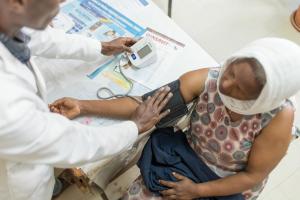Noncommunicable diseases increase risk of dying from COVID-19 in Africa
Brazzaville, 10 September 2020 – There is increasing evidence that Africans living with noncommunicable diseases (NCDs) such as hypertension and diabetes are more likely to suffer severe cases of COVID-19 and die.
In South Africa, which accounts for nearly half of all cases and deaths on the continent, 61% of the COVID-19 patients in hospitals had hypertension and 52% had diabetes. And 45% of people aged 60–69 who died from COVID-19 also had hypertension. In Kenya, around half of COVID-19 deaths occurred in people with NCDs, while in the Democratic Republic of the Congo, such patients accounted for 85% of all COVID-19 deaths.
According to a World Health Organization (WHO) preliminary analysis of 14 countries in the African region, hypertension, diabetes, cardiovascular disease and asthma are the co-morbidities most associated with COVID-19 patients. These chronic conditions require continuous treatment, but as governments address the ongoing pandemic, health services for NCDs have been severely disrupted.
“Millions of Africans living with noncommunicable diseases are at greater risk of complications or dying from COVID-19,” said Dr Matshidiso Moeti, WHO Regional Director for Africa. “So it is very concerning to find that just when people with hypertension and other chronic conditions most need support, many are being left out in the cold.”
In a WHO survey of 41 countries in sub-Saharan Africa, 22% of countries reported that only emergency inpatient care for chronic conditions is available, while 37% of countries reported that outpatient care is limited. Hypertension management has been disrupted in 59% of the countries, while diabetic complications management has been disrupted in 56% of the countries.
The closure or slowdown in services is likely to further aggravate the underlying conditions of patients, leading to more severe cases of NCDs. It also exacerbates the susceptibility of people living with chronic conditions to COVID-19.
WHO is working with countries to identify the challenges associated with providing essential services for people with NCDs and is supporting governments to implement strategies to increase service availability. WHO has assisted Member States in devising alternative approaches to providing health services, including increased use of telemedicine. Additionally, WHO has helped restore screenings for chronic conditions and has provided the basic equipment needed for diabetes and hypertension care in seven Member States. WHO is also working to increase public knowledge about the strong link between chronic conditions and COVID-19.
In moving forward, WHO recommends controlling the use of tobacco and alcohol because both increase the risk of NCDs. It is also important to ensure quality primary care and referral systems to help people obtain the right treatment at the right time. There should also be a range of medicines and techniques available to support early diagnosis and treatment of NCDs.
Even prior to the current pandemic, NCDs were a major health challenge, impacting a growing number of Africans. In 2015, NCDs killed 3.1 million people in the African region up from 2.4 million in 2010.
Dr Moeti was joined by Dr Aggrey Mweemba, Head Clinical Care, Levy Mwanawasa University Teaching Hospital in Zambia and Dr Mary Amuyunzu-Nyamongo, Executive Director, African Institute for Health and Development in Kenya in a virtual press conference on COVID-19 and NCDs today facilitated by APO Group.
Communications and marketing officer
Tel: + 242 06 520 65 65 (WhatsApp)
Email: boakyeagyemangc [at] who.int (boakyeagyemangc[at]who[dot]int)
Communications Manager
WHO Regional Office for Africa
Email: okas [at] who.int (okas[at]who[dot]int)
Tel: +242 06 508 1009



